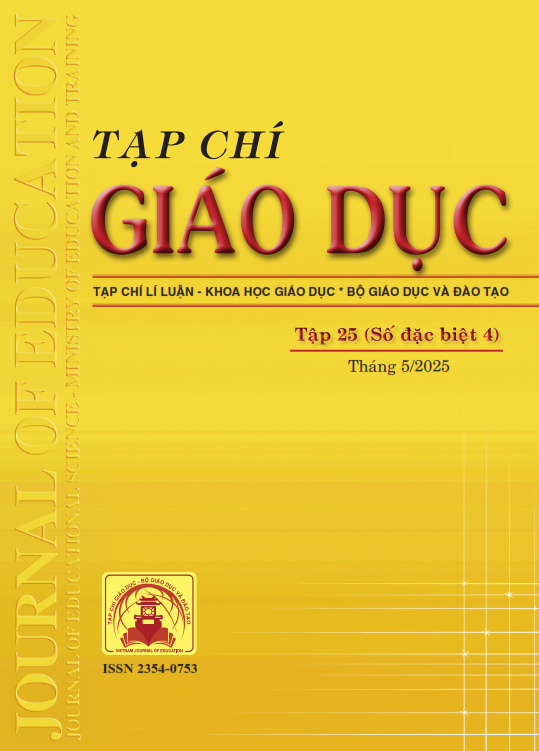Mối quan hệ giữa phong cách giáo dục của cha mẹ và hành vi gây hấn ở học sinh trung học tại các trường phổ thông dân tộc nội trú
Tóm tắt
Parenting styles significantly influence adolescent behavior, particularly aggressive behaviors. Among these, school violence in ethnic boarding schools has emerged as a serious issue. However, research on the relationship between parenting styles and students' aggressive behavior within this context remains limited. This study surveyed 533 secondary school students from ethnic boarding schools in Dong Nai, Tay Ninh, and Binh Phuoc provinces. The findings indicate that authoritative parenting style predominates among families. Students’ aggressive behavior was observed at a moderate level, with differences noted between genders and ethnic groups. Furthermore, the negative correlation between the two dimensions Responsiveness, Demand of parents’ parenting styles and students’ aggressive behavior suggests that higher levels of responsiveness and demand of parenting styles are associated with lower levels of students’ aggression. These findings highlight the crucial role of family in regulating students’ behavior and underscore the necessity of collaboration between families and schools in fostering a healthy educational environment.
Tài liệu tham khảo
Anderson, C. A., & Bushman, B. J. (2002). Human aggression. Annual Review of Psychology, 53(1), 27-51.
Bùi Thị Thu Huyền, Trần Thị Lệ Thu (2020). Thích ứng bảng hỏi hành vi gây hấn công cụ và gây hấn phản ứng trên mẫu học sinh Việt Nam. Tạp chí Tâm lí học, 5(254), 50-62.
Cao Thị Phương Chi. (2024). Thực trạng bắt nạt học sinh ở các trường phổ thông dân tộc nội trú và bán trú. Tạp chí Khoa học Giáo dục Việt Nam, 20(S1), 79-84.
Dương Thị Diệu Hoa (chủ biên), Nguyễn Ánh Tuyết, Nguyễn Kế Hào, Phan Trọng Ngọ, Đỗ Thị Hạnh Phúc (2008). Giáo trình tâm lí học phát triển. NXB Đại học Sư phạm.
Estlein, R. (2016). Parenting styles. Encyclopedia of family studies, 1-3. https://internationalparentingschool.com/ wp-content/uploads/2019/07/Encyclopedia-of-Family-Studies-Parenting-Styles-Estlein-Roi-2016.pdf
He, E., Ye, X., & Zhang, W. (2023). The effect of parenting styles on adolescent bullying behaviours in China: The mechanism of interpersonal intelligence and intrapersonal intelligence. Heliyon, 9(4), e15299. https://doi.org/ 10.1016/j.heliyon.2023.e15299
Le, D. T., Van Huynh, S., Vu, T. V., Dang-Thi, N.-T., Nguyen-Duong, B.-T., Duong, K. A., Mai, T. N., Huynh, T. N., Mai, P. T., & Tran-Chi, V.-L. (2023). Personality traits and aggressive behavior in Vietnamese adolescents. Psychology Research and Behavior Management, 16, 1987-2003. https://doi.org/10.2147/PRBM.S405379
McKee, M. L., Mortimer, J. E., Maricle, D. E., Neuhaus, D., Konstam, E., Senland, A.,… Pajares, F. (2011). Baumrind’s Parenting Styles. In M. L. McKee, Encyclopedia of Child Behavior and Developmen, 213-215. https://doi.org/10.1007/978-0-387-79061-9_293
Nguyễn Thị Tứ (chủ biên), Lí Minh Tiên, Bùi Hồng Hà, Huỳnh Lâm Anh Chương (2016). Tâm lí học lứa tuổi và tâm lí học sư phạm. NXB Đại học Sư phạm Thành phố Hồ Chí Minh.
Özdemir, Y., Vazsonyi, A. T., & Çok, F. (2013). Parenting processes and aggression: The role of self‐control among Turkish adolescents. Journal of Adolescence, 36(1), 65-77. https://doi.org/10.1016/j.adolescence.2012.09.004
Poulin, F., & Boivin, M. (2000). Reactive and proactive aggression: evidence of a two-factor model. Psychological assessment, 12(2), 115-122. https://doi.org/10.1037//1040-3590.12.2.115
Raine, A., Dodge, K., Loeber, R., Gatzke‐Kopp, L., Lynam, D., Reynolds, C., Stouthamer‐Loeber, M., & Liu, J. (2006). The reactive–proactive aggression questionnaire: differential correlates of reactive and proactive aggression in adolescent boys. Aggressive Behavior: Official Journal of the International Society for Research on Aggression, 32(2), 159-171. https://doi.org/10.1002/ab.20115
Sidorowicz, K., & Hair, E. C. (2009). Assessing peer conflict and aggressive behaviors: A guide for out-of-school time program practitioners. Child Trends, 43, 1-5.
Trần Hằng Ly (2019). Hành vi gây hấn của học sinh trung học cơ sở. Luận án tiến sĩ Tâm lí học, Trường Đại học Sư phạm Hà Nội. https://edu.vinhuni.edu.vn/Upload/files/TLGD/Thesis/SPH-2019-113003.pdf
Trương Thị Khánh Hà (2013). Tâm lí học phát triển. NXB Đại học Quốc gia Hà Nội.
Đã Xuất bản
Cách trích dẫn
Số
Chuyên mục
Giấy phép

Tác phẩm này được cấp phép theo Ghi nhận tác giả của Creative Commons Giấy phép quốc tế 4.0 .












